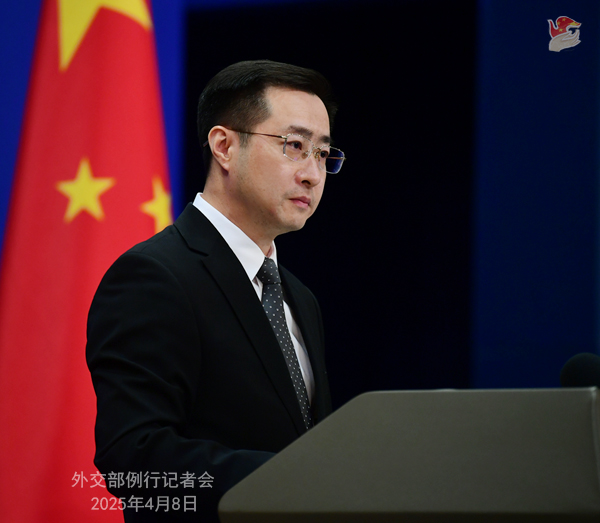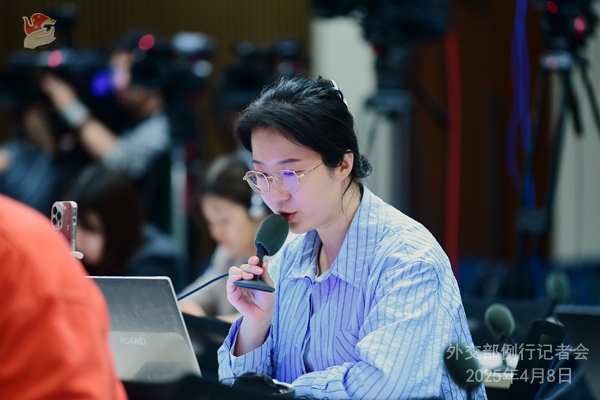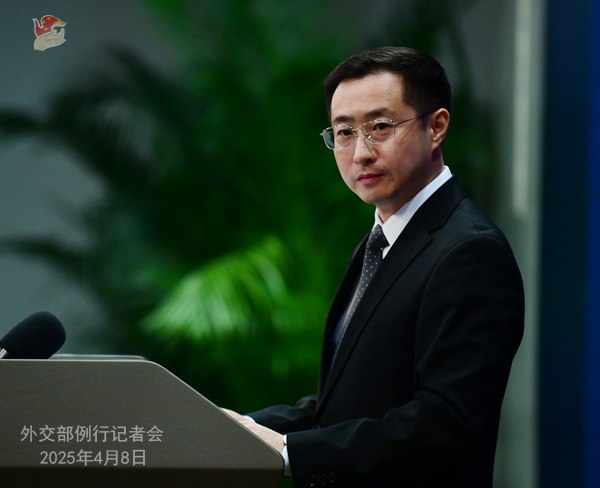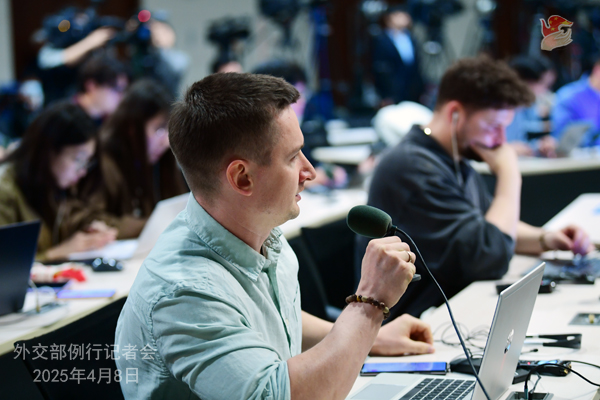
At the invitation of Premier of the State Council Li Qiang, Spanish Prime Minister Pedro Sánchez will visit China from April 10 to 11.
CRI: On your announcement about Spanish Prime Minister Sánchez’s upcoming visit to China, could you share the arrangements for this visit? We noted that this will be Prime Minister Sánchez’s second visit to China in less than a year. How do you comment on the highly frequent high-level interactions between China and Spain?
Lin Jian: This visit marks Prime Minister Sánchez’s third trip to China within three years. During the visit, President Xi Jinping will meet with him, and Premier Li Qiang will hold talks with him.
Spain is an important cooperative partner for China within the EU. The two sides have always adhered to the principles of mutual respect, mutual trust, and mutual benefit. Our bilateral relations are at the forefront of China’s ties with European countries. This year marks the 20th anniversary of the China-Spain comprehensive strategic partnership. China hopes to take this visit as an opportunity to deepen strategic mutual trust between the two sides, expand open cooperation, jointly address global challenges, and achieve new progress for the China-Spain comprehensive strategic partnership from a new starting point.
Anadolu Agency: U.S. President Donald Trump threatens China with additional 50 percent tariffs unless China cancels its retaliatory tariffs against the U.S. until April 8. What is China’s comment?
Lin Jian: America’s abuse of tariffs severely infringes on the legitimate rights and interests of other countries, violates the WTO rules, undermines the rules-based multilateral trading system, and impact the stability of the global economic order. It’s a typical move of unilateralism, protectionism and economic bullying, which is widely opposed by the international community. China deplores and rejects it.
Let me stress once again that trade and tariff wars have no winners, and protectionism leads nowhere. We Chinese are not troublemakers, but we will not flinch when trouble comes our way. Intimidation, threat and blackmail are not the right way to engage with China. China will take necessary measures to firmly safeguard its legitimate and lawful rights and interests. If the U.S. decides not to care about the interests of the U.S. itself, China and the rest of the world, and is determined to fight a tariff and trade war, China’s response will continue to the end.
China News Service: Recently, a think tank article stated that China and ASEAN are emerging centers of growing influence in East Asia. ASEAN-China relations are predicated on mutual and complementary needs, as exemplified by their vigorous and steadily growing trade relationship. These relations are sustained by common values. ASEAN-China relations are of vital importance not only for Asia but also the international community. Observers note that China-ASEAN cooperation is an exemplary model for China’s relations with neighboring countries. How do you view China’s cooperation with ASEAN and interactions with its neighboring countries?
Lin Jian: Over the 30-plus years since establishing dialogue relations, China and ASEAN have enjoyed steadfast, steady and robust cooperation, setting a model with the most dynamic and fruitful cooperation in the Asia-Pacific region and the world. For five consecutive years, China and ASEAN have been each other’s largest trading partners. In 2024, bilateral trade reached RMB 6.99 trillion, and the upgraded protocol for the China-ASEAN Free Trade Area Agreement 3.0 is expected to be signed within the year. Landmark projects such as the China-Laos Railway and Hanoi Metro Line 2 in Viet Nam have delivered tangible benefits to local communities. Digital empowerment and green development have become emerging areas where China supports ASEAN countries’ economic transition.
The China-ASEAN relations are a vivid illustration of China’s commitment to the principle of amity, sincerity, mutual benefit and inclusiveness in neighborhood diplomacy and a good-neighborly and friendly policy. The political mutual trust and convergence of interest between China and its neighbors have continued to deepen. China has reached common understandings with 17 neighboring countries on the building of a community with a shared future, signed an agreement on the Belt and Road cooperation with 25 neighboring countries and become the top trading partner of 18 countries in its neighborhood. Solid progress has been made in advancing major landmark projects of high-quality BRI cooperation. Small and smart livelihood projects have delivered tangibly for more people in China’s neighboring countries. Regional cooperation mechanisms including East Asian cooperation, the Lancang-Mekong cooperation, the China-Central Asia cooperation and the Shanghai Cooperation Organization have vigorously boosted the process of regional economic integration.
We believe that harmony is key to a prosperous family in all endeavors. As a member of the Asian family, China will continue to treat its neighbors with friendliness and sincerity and jointly pursue reciprocity, mutual benefit, openness and inclusiveness, be rooted in and contribute to its neighborhood, ensure that more Asian people will benefit from the principle of amity, sincerity, mutual benefit and inclusiveness and inject more stability into and bring more hopes for the world with an Asian community with a shared future.

AFP: I wanted to return to the threats by President Trump that he might impose a further 50 percent tariff against Chinese imports. China already said in response that it would resolutely take countermeasures to safeguard Chinese rights and interests. Can the Foreign Ministry give any specific details about what those kinds of measures might look like in practice?
Lin Jian: We will not let anyone take away the Chinese people’s legitimate right to development. We will not tolerate any attempt to harm China’s sovereignty, security and development interests. We will continue to take resolute and strong measures to safeguard our legitimate rights and interests.
Bloomberg: This afternoon we saw several influential Chinese bloggers post an identical set of measures that authorities are mulling to hit back at the latest tariff threats from Trump. These include levies on U.S. farm goods and a ban on Hollywood movies. There were four other items listed. Are these actual responses the government is considering? Is this a coordinated attempt to inform the public about China’s response?
Lin Jian: We don’t comment on what’s been said on the Internet. I just made clear China’s position. We will continue to take resolute measures to safeguard our legitimate and lawful rights and interests.
AFP: The U.S. and Iran have announced talks over the nature of Iran’s nuclear program. I’m wondering if the Chinese side has any response to that development?
Lin Jian: We noted relevant reports. China all along believes that the only right choice for settling the issue is through political and diplomatic means.
Against the current backdrop, it’s all the more important for parties to the Iranian nuclear issue to work in the same direction, strengthen dialogue and engagement, and avoid any escalation. As the country which unilaterally withdrew from the Joint Comprehensive Plan of Action and caused the current situation, the U.S. needs to show political sincerity, act in the spirit of mutual respect, engage in dialogue and consultation, and stop the threat of force and maximum pressure.
China will continue to maintain communication with relevant parties, actively promote talks for peace, and help relevant parties reach as early as possible a diplomatic settlement to the Iranian nuclear issue that accommodates all parties’ legitimate concerns so as to uphold the international non-proliferation regime and keep the Middle East peaceful and stable.

NBC: With all of the threats and counter threats and measures being taken between the U.S. and China on tariffs, can you confirm are there any talks or negotiations happening at any level between the United States and China over trade?
Lin Jian: Judging from its actions, the U.S. doesn’t seem to be serious about having talks right now. If the U.S. truly wants to talk, it should let people see that they’re ready to treat others with equality, respect and mutual benefit. If the U.S. decides not to care about the interests of the U.S. itself, China and the rest of the world, and is determined to fight a tariff and trade war, China’s response will continue to the end.
Beijing Daily: It’s reported that Mauricio Claver-Carone, U.S. State Department’s Special Envoy for Latin America, said in a recent interview that China has used its currency swap with Argentina to extort the country, and the U.S. wants Argentina to end it. He said the U.S. wants to be sure that Argentina’s potential agreements with the IMF do not end up prolonging that credit line or swap that they have with China or strengthen China’s position with that credit line. What’s China’s comment?
Lin Jian: China has all along conducted practical cooperation with Argentina in various fields on the basis of equality and mutual benefit. For a long time, Argentina’s currency swap with China has played an important role in stabilizing its economy and finance, which is welcomed and well received in Argentina.
China’s bilateral cooperation with relevant countries never targets any third party, nor should it be interfered by any third party. Fair-minded people are able to tell who is extorting and coercing others and making trouble. We call on the U.S. to get its perspective right and make more tangible contributions to the development of Latin American and Caribbean countries, rather than make an effort to drive a wedge.
TASS: The spokesperson of the Iranian Foreign Ministry said that from April 7 to 8, China, Russia and Iran will have trilateral consultations on the Iranian nuclear issue in Moscow. What’s the Foreign Ministry’s comment?
Lin Jian: Let me reiterate that China firmly believes that the only right choice for settling the issue is through political and diplomatic means. We support Russia in hosting this trilateral expert-level consultation, which will further promote the political and diplomatic settlement of the Iranian nuclear issue.
China will continue to have communication and coordination with relevant parties, and facilitate the settlement to the Iranian nuclear issue that accommodates all parties’ legitimate concerns so as to uphold the international non-proliferation regime and keep the Middle East peaceful and stable.
Shenzhen TV: Speaking in an interview on Trump administration’s trade policy on China, Vice President JD Vance said the U.S. borrows money from Chinese peasants to buy the things those Chinese peasants manufacture. What’s China’s comment?
Lin Jian: China has made its position perfectly clear on its trade relations with the U.S. To hear words that lack knowledge and respect like those uttered by this Vice President is both surprising and kind of lamentable.
